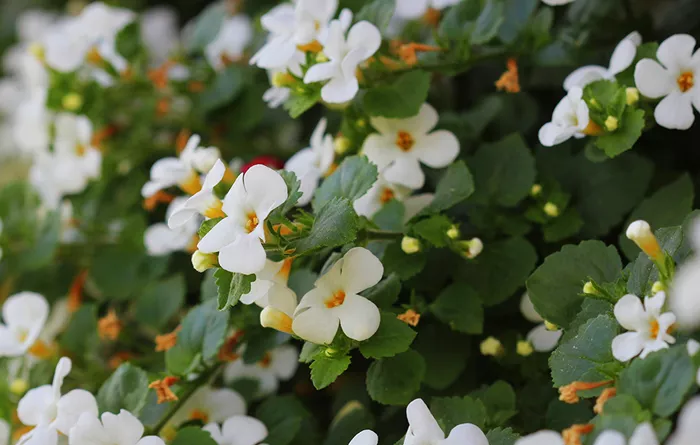Tired of dull flower beds and relentless weeds? Discover bacopa (Sutera cordata), the flowering ground cover that adds a burst of color, suppresses weeds, and simplifies garden maintenance. This versatile plant is the secret to a vibrant, healthy, and effortlessly beautiful garden.
Bacopa, with its star-shaped blossoms in hues of blue, lavender, and the warm tones of the ‘African Sunset’ cultivar, brings visual interest to the lowest level of your flower beds. Thriving as a perennial in USDA hardiness zones 9 through 11 and as an annual in other regions, bacopa offers long-lasting beauty and ground cover.
Why Gardeners Love Bacopa:
Vibrant Color: Bacopa fills flower beds with a carpet of star-shaped flowers in various colors.
Weed Suppression: Its dense growth smothers weeds, reducing competition for nutrients and sunlight.
Erosion Control: Bacopa’s extensive root system binds soil particles together, preventing erosion on slopes or in areas prone to soil movement.
Low Maintenance: No deadheading required! Simply trim off dead stems and dispose of dropped leaves to prevent botrytis fungus.
Beneficial Plant: Ground covers in general help conserve water by shading the soil, create habitats for insects, and act as living mulch.
Growing Tips for Bacopa:
Sunlight: Bacopa appreciates partial to full sun.
Watering: Keep soil consistently damp, but avoid waterlogging.
Temperature: Plant after the danger of frost has passed.
Soil: Not picky about soil texture, weight, or pH, as long as it drains well.
Fertilizer: Feed established plants a balanced NPK fertilizer every week or two during the blooming season.
Companion Plants:
Bacopa thrives in the same conditions as many popular flowers, including angelonia, petunias, and wax begonias. Its low growth habit (under 6 inches) ensures it won’t overshadow taller flowers.
Propagation:
Easily propagated from cuttings, seeds, or young plants from a garden center.After your new plants are established, feed them a balanced NPK fertilizer such as Covington Naturals 10-10-10 liquid fertilizer every week or two. This will ensure that they have plenty of nutrients throughout their long blooming season.


